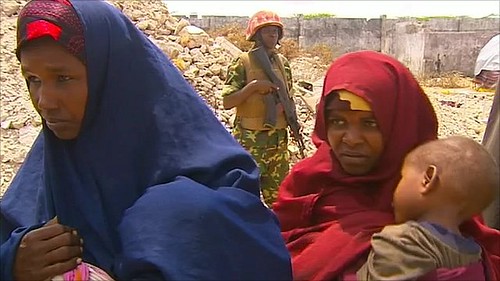
Women in Somalia have been forced to bear the brunt of the drought now taking place in the Horn of Africa region. The United Nations has delcared famine in two areas in the south of the country., a photo by Pan-African News Wire File Photos on Flickr.
22 July 2011
Last updated at 06:34 ET
Somalia's hungry head for a war zone
By Will Ross
BBC News, Mogadishu
You might have thought the seemingly endless conflict for control of Somalia's capital, Mogadishu, would mean it is a place best avoided if you can help it.
But for tens of thousands of Somalis hit by drought and now the threat of widespread famine, that danger is eclipsed by a glimmer of hope - an escape from the hunger.
"With this drought we were hungry at home - no water no food; so we decided to leave the village and head to a camp," said mother-of-five Safia Ali Noor, who caught a lift on the back of a truck for the more than 200km- (125 mile-) journey to Mogadishu.
Her twins, Nasir and Abshir, are desperately in need of help.
They are 12 months old but look as fragile as new-born babies so severe is their malnutrition.
A young woman pushes long sticks into the sandy ground - the frame for a new home that will be draped in cloth or, if she is lucky, a donated plastic sheet.
Badbaado Camp was only opened on 12 July. It is already home to more than 21,000 people.
Cross-fire
One of several camps for internally displaced people in Mogadishu, it lies just 400m from the front line in the conflict between pro-government forces and the Islamist, al-Qaeda-linked insurgents, al-Shabab.
Bullets sometimes hit the camp during cross-fire.
It is protected by soldiers from the transition government - whose uniforms are as diverse as their ages.
One 13 year old held his AK47 assault rifle tightly as he sat in the back of a 4x4.
Somalia has been at war for two decades
At the camp's therapeutic feeding centre you get a picture of just how deep the crisis is.
Twenty years of war followed by prolonged drought have taken their toll.
In the rubble of a once grand but now destroyed home, women queue up cradling their babies.
Well over 1,000 children have been registered as malnourished in this camp in just nine days.
Aid agencies are trying to rescue them, offering the peanut-based Plumpy'nut therapeutic food as well as medicine and vaccines.
"We really need to have enough supplies to provide for these children," said Rozanne Chorlton, Somalia representative for the UN children's agency.
"We need vaccinations and supplementary food; we need clean water and sanitation facilities. Of course fundamentally we need food," she said.
"Many children are getting here too late; many are being referred to the hospital stabilisation centre but those children are already in a very, very bad condition."
Kenya's Dadaab Refugee Camp Unable to Accomodate the Growing Need
Somalia Refugee Crisis
By OLIVIA KATRANDJIAN and LAMA HASAN (@LamaHasan)
July 23, 2011
Every day hundreds of refugees arrive at the Dadaab refugee complex in Kenya after walking for weeks through the desolate terrain to escape drought and famine in Somalia.
The crisis has been brought on by a deadly combination of severe drought, with no rain in the region for two years, a huge spike in food prices and a brutal civil war in Somalia.
It is too dangerous for international humanitarian aid workers to reach the almost 3 million people in need because of the insecurity and demands by Al-Shabaab, the al Qaeda affiliated terrorist organization that until recently had banned aid workers from operating in the region.
Somalis have no choice but to flee to neighboring Kenya and Ethiopia.
But even at Dadaab, the world's largest refugee settlement comprised of three separate camps and now home to almost 400,000 Somalis, there is not enough space or supplies to meet the growing demand.
More than 1,300 refugees arrive at the camp every day, but workers do not have the means to provide everyone with the help they so desperately need, leaving many refugees waiting at the complex's gates.
How to Help
There are only seven ambulance drivers for the 122,000 people sprawling across one of the three camps. They have no medical equipment or paramedics. The ambulances don't even have a siren to put on as they race to find the sick.
The complex is so vast and the tents are so spread out that even when the ambulances get a call about a woman in labor, it's usually too difficult to find her.
A growing number of women are being sexually assaulted on their long walk to the camps. Many will not talk about it because they are too ashamed.
It is the job of Sinead Murrey, the gender-based violence program manager of the Inyernational Red Cross, to lend these women a comforting ear.
"I think the challenges in Dadaab, it's such a complex environment even before the influx and now with the increase in volume, especially female head of households and large numbers of women and girls who have most likely experienced violence on the way ... is ... a massive challenge," Murrey said.
When asked why she takes on such a massive challenge, Murrey replied, "At a personal level? I am passionate about it."
No comments:
Post a Comment